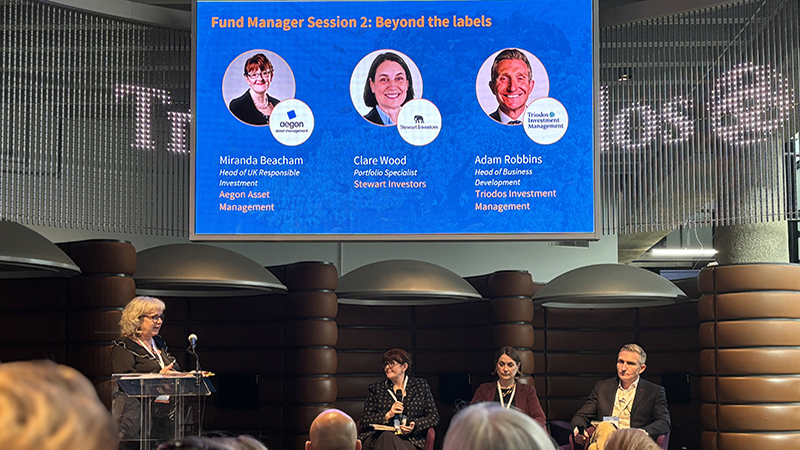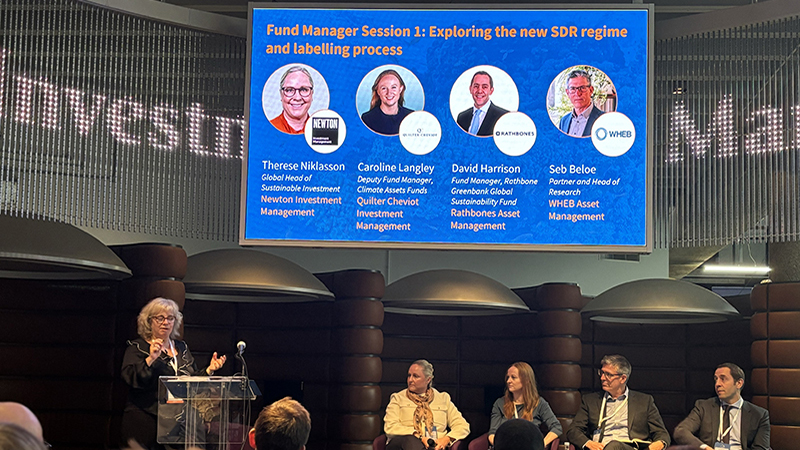Fund group representatives have shared the “back and forth” experience of applying for fund labels under the Sustainability Disclosure Requirements (SDR) describing how it has been extremely challenging to come up with the right disclosures – while at the same time not needing to change funds’ philosophies and processes.
In a panel at the SRI Services’ Good Money Week conference, host Julia Dreblow (see above) described the SDR implementation process as “quite bruising” for some but something that fund managers have said is needed.
See also: Hawksmoor temporarily suspends sustainable portfolios in anticipation of SDR amendments
Panellist Therese Niklasson, global head of sustainable investment at Newton Investment Management, said it had been “tricky” going “back and forth with the regulator” – the UK’s Financial Conduct Authority (FCA).
“Our experience has been it has been hard to see the goalposts. Things come back from the FCA saying it’s not quite right, but we are not told what is not right.”
She added there have been extra details to add into the prospectus to obtain a label, but she is concerned about the simplicity of these in the eyes of a retail investor.
“It has been tricky to get it right,” she added.
Caroline Langley, deputy fund manager of the Climate Assets funds at Quilter Cheviot Investment Management, also shared her firm’s frustrations on applications being returned with little clarity on what needs to be amended.
“We have had three applications with the FCA for ‘focus’ labels and we are in the process of engaging with the regulator.
“It sometimes feels like one word is missing or needs to be adjusted – but we are not sure on the word that will make it work for them.”
‘Unintended consequences’
Another challenge highlighted by was when the anti-greenwashing rules came into force in at the end of May 2024.
Langley described the “unintended consequences” of language being used in documents. She said previously the firm used ‘focus’ as a category in its own description of funds but had to remove any references to this due to the SDR label for funds – Sustainability Focus.
This was a common reflection among the panellists with WHEB’s head of research Seb Beloe also flagging while the investment process has not changed on the WHEB FP Sustainability Impact OEIC, language used in documents needed to be amended. The fund has since been approved by the regulator for the Sustainability Impact label.
“The investment process hasn’t changed but we have had to be clearer and more precise in the language we use around what we do and how it links back to the fund’s objective.
“It was perhaps a painful process – maybe unnecessarily cryptic – but we got that label at the end of September and a lot of our clients see that as validation in what we do.”
David Harrison, manager of the Rathbone Greenbank Global Sustainability fund, also said there have been no changes to the fund itseld, but the label application process has caused them to “kick the tyres” on the fund’s investment process and philosophy.
“We can’t step away from our process and philosophy and we have always been transparent in our communication – but we are making sure there are no misunderstandings around terminology and it is pleasing to see no changes.”
‘Worth it in the end’
Ultimately, the panellists did agree however that SDR is a positive for the industry.
Langley said: “It is a process that will make things better and clearer. We will get to a stage where advisers can fairly compare the prospectuses and disclosures of funds and then be able to answer client questions on what the best product for them is.
“I do think it will be worth it when we get there in the end.”
WHEB’s Beloe agreed it is in everyone’s interest to persevere with the SDR labels, even though he reiterated how the fund’s objective and strategy had grown from one page to 15 pages.
He explained how the firm is sharing its experience with its peers so that more funds in the industry can obtain an SDR label.
“I don’t think we are at a point where the market quite knows what to do with the labels yet, we are still in wait-and-see mode.
“But we as a business are on a mission to advance sustainable investing and genuinely are trying to support our peers, the ones who are doing an authentic, high-quality job, in getting labels. We are very pleased to share our experiences explicitly to those who want to hear what we have done.”

Ethical funds
In another panel at the Good Money Week conference (see above) titled Beyond the Labels, Miranda Beacham, head of UK responsible investment at Aegon Asset Management, said even though the firm spent a lot of time working on the consultancy of SDR, the “implementation is far more challenging than we ever anticipated”.
She said Aegon AM was in the process of applying for focus labels: “It’s taking a bit more time than we thought but we hope are successful”.
One area, she added, where the regime falls short, is for ethical funds.
“We have been these funds for 25 years and its completely unambiguous.
See also: Aviva Investors backs King’s College Consumer Duty and SDR course for IFAs
“The cornerstone of SDR is clarity, transparency and trust – you can’t get much more of that than with ethical funds.
“But the FCA do not recognise them so they will be sitting in the unlabelled space, which is really sad. The logical consequence of not investing in companies that cause environmental and social harms is that you select companies that do something good in those areas.”
Dreblow added: “And retail clients like the unambiguity of exclusionary and ethical funds. It’s a lot easier to trust and I hope the FCA changes its stance on that.”
Adam Robbins, head of business development at Triodos Investment Management, also commented his firm’s funds, as offshore vehicles, were currently out of scope for SDR but they are Article 9 under SFDR, and the team are paying close attention to the mapping across the legislations for when or if SDR is rolled out.
No label
Meanwhile, Clare Wood, portfolio specialist at Stewart Investors explained the firm’s decision to drop ‘sustainability’ from its fund name and not go for a label.
“As a business, we had been discussing dropping ‘sustainability’ from the name for some time. We only run sustainable strategies, so we don’t need to differentiate. We did a lot of work with the FCA to figure out how this could work for us but as a strategy that is bottom up, long only and run using qualitative analysis – which is thread through everything we do not just a few funds – we couldn’t make it fit.
“At this point in time, we felt it was best to not go for a label, but the door is not closed, we are still engaging with the FCA to see where we might in the future.”
This story originated on our sister title, PA Future








